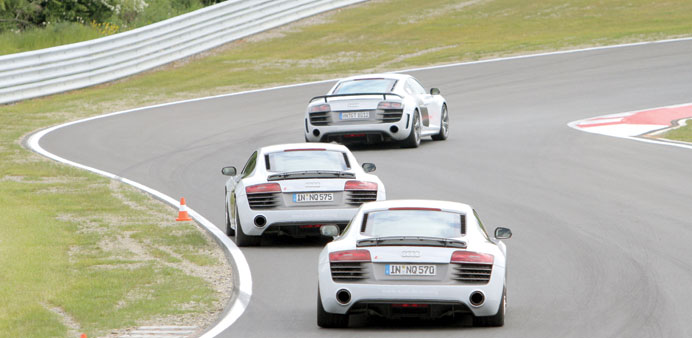By Matthias Benirschke
It’s a boyhood dream come true. A couple of aristocratic German petrol-heads have built themselves a brand-new racetrack in their (very large) back garden. One of them can hardly contain his enthusiasm.
“Fantastic isn’t it,” said Johann Friedrich von der Borch, surveying the 4.2km of asphalt curves and straights from the terrace of the clubhouse in the low, forested hills of the Teutoberg Forest. “This is the place where men can go back to being boys for a few hours.”
The recently opened Bilster Berg Drive Resort lies in the heart of Germany. It is the first competition raceway and car testing facility to be built in the western half of the country in 80 years. Germany’s other famous tracks, Hockenheimring and Nuerburgring, were opened in 1927 and 1932 respectively.
The Bilster facility was built on the 84-hectare site of a former British Army ammunition dump.
Not all the residents hereabouts are as thrilled to bits about it as the baron. Some locals and environmental activists have campaigned against the noise and disruption. The track is more or less fully booked-out by drivers anxious to prove the mettle of racing machinery and the drone of high-performance engines reverberates throughout the area.
The cars hurtle past trees, Galloway cattle, and various track landmarks such as the “Fledermaushaus” or little house of the bats. “The straight takes you into the corner T1 (Turn 1) and at the ammo dump the circuit twists its way up the hill. You’ve got to get the car back into line here in order to get maximum grip,” said driver Marcus Oeynhausen-Sierstorpf enthusiastically.
It was during a cycling tour of this hilly terrain that he, a German count, and von der Borch, a baron, came up with the scheme to build a racetrack.
The circuit is not just for speed freaks. The Bilster resort hopes to attract car companies who need an upmarket location for a car model launch or a venue to invite journalists to put new machinery through its paces.
The shrieks and wails of upset local residents did threaten to derail the project for a while. A campaign entitled “peace and quiet on Bilster Hill” delayed the project, various court cases ensued and the planners were forced to make some concessions.
One of the critics is Ulrich Kros. Back in 2004 he built a house for his family some 3km as the crow flies from the track. “When I saw the plans I knew straight away that it would get noisy and nature would be trampled on.”
Campaigners joined forces with nationwide environmental pressure group BUND and some went to court to obtain assurances on stricter noise limits. No other legal actions are pending.
Oeynhausen-Sierstorpff currently has other things on his hands.
He thunders around the course, steering his powerful charge into one corner after another, up hills and down hollows, flying through T5 where a tree stands and T8 whose German name “Sauwechsel” suggests that hogs might trot across the tarmac any moment.
The driver revels in the panoramic views of the Teutoberg Forest while his co-pilot braces for a section of course called “the Mousetrap”.
Short stretches of straight-line driving are the only relief as the circuit continues to plunge up hill and down dale with plenty of curves on the way. Piloting around this track calls for a high degree of driving skill.
Oeynhausen-Sierstorpff has turned his family seat in Bad Driburg in North Rhine Westfalia state into a thriving commercial empire. His business interests include a mineral water spa, a luxury hotel with wellness facilities and four health hotels. The new track is the unique selling feature that had been missing until now.
The British abandoned their ammo dump in 1993 and ownership reverted to Johann Friedrich Freiherr von der Borch — to give him his correct German aristocratic name.
Investors have ploughed €34mn into the project and were able to secure the support of renowned racetrack creator Hermann Tilke, who has designed several Formula One venues, along with rally-sport icon Walter Roehrl.
Kros laments that most people in the region were clearly reluctant to speak out openly against the prestige project. He claims objectors were intimidated by the “economic heavyweight status” of the Oeynhausen-Sierstorpff family.
Kros also thinks that it is madness to spend so many millions on a circuit for combustion-engine technology, which he says is ultimately doomed to extinction. – DPA

* Audi R8 sports-cars race around the circuit at the new Bilster Berg Drive Resort in northern Germany.
